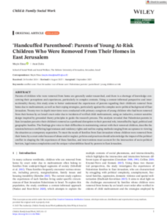Parents of children who were removed from home are generally under-researched, and there is a shortage of knowledge concerning their perceptions and experiences, particularly in complex contexts. Using a context-informed perspective and intersectionality theory, this study aims to better understand the experiences of parents regarding their children's removal from home due to maltreatment, as well as their coping strategies, particularly against the complex socio-political background of East Jerusalem. Twenty-two in-depth interviews were conducted with primary caregivers of young children who had been removed from their homes by an Israeli court order due to incidents of verified child maltreatment, using an inductive, context-sensitive design inspired by grounded theory principles to guide the research process. The analysis revealed that Palestinian parents in East Jerusalem perceive their children's removal as a profound disruption to their parental role, intensified by legal, political and geographic hurdles. The findings give voice to their difficulties in maintaining contact with their removed children, describe the tensions between conflicting legal statuses and residency rights and outline coping methods ranging from acceptance to viewing the situation as a temporary separation. To meet the needs of families from East Jerusalem whose children were removed from their home by a court order because of abuse and/or neglect, policies and practices should acknowledge the impact of the political conflict in shaping the life experiences of these families, and interventions must account for the intersection of socio-political barriers, legal status complexities and the unique vulnerabilities faced by parents in East Jerusalem.

